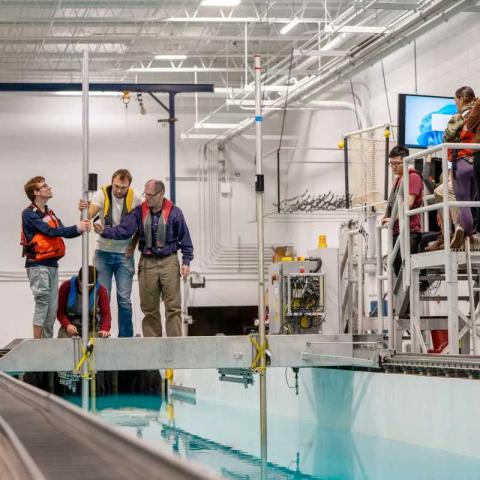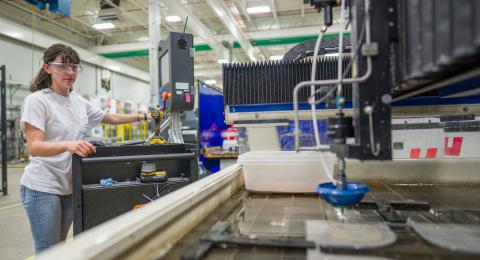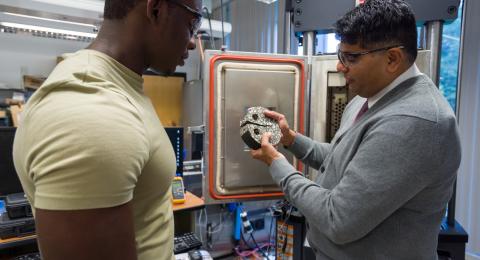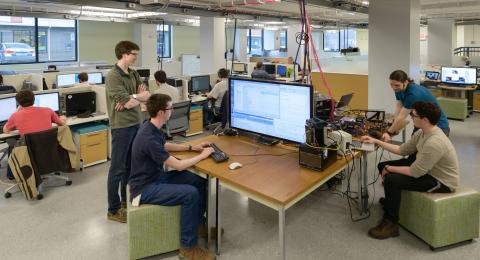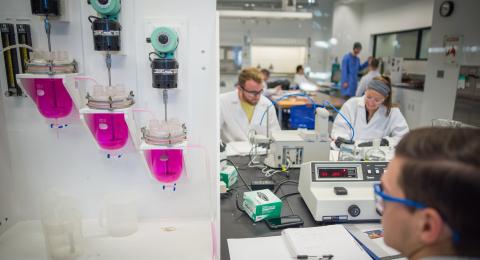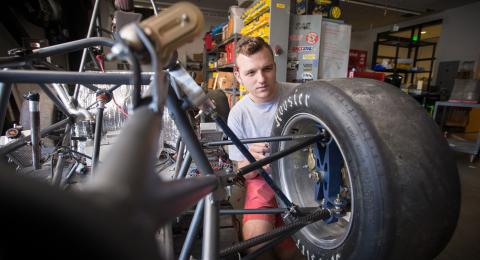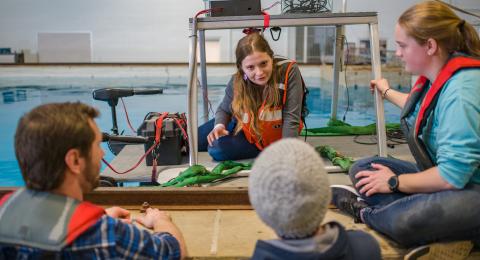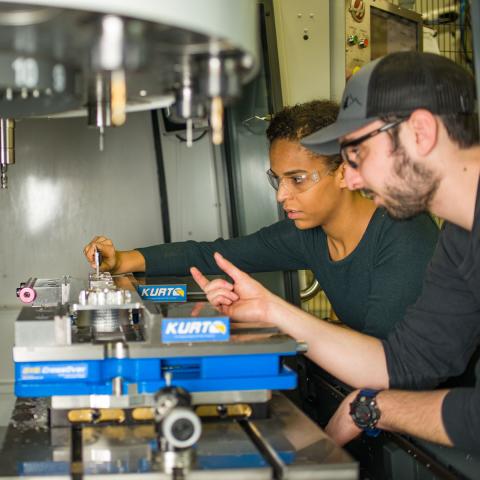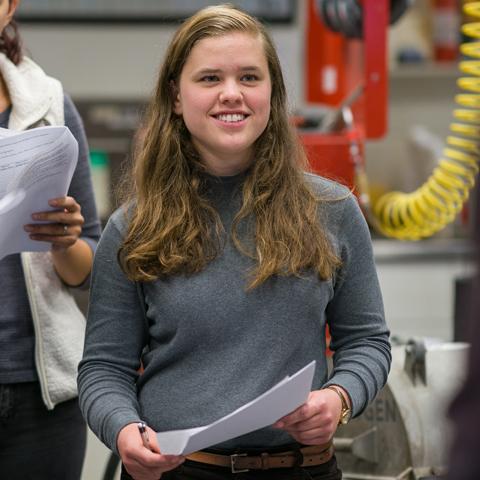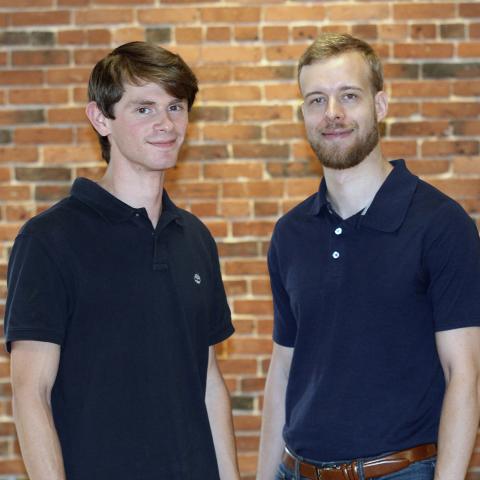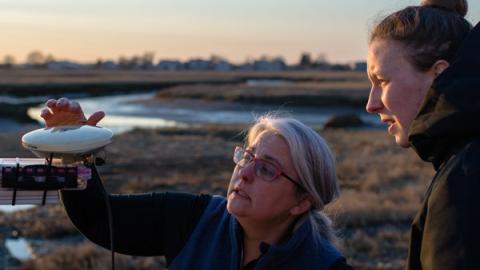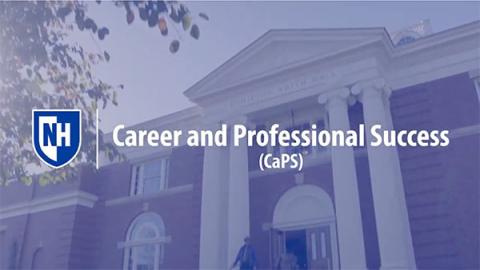Take a look at resources that offer an inside view of academic programs, student life, and career opportunities at UNH’s College of Engineering and Physical Sciences (CEPS). Whether you're planning your next steps or just getting to know UNH, these tools will help you picture your future as a Wildcat.
Real-world Impact
Our students gain hands-on experience through research and internships, applying classroom knowledge to real-world challenges and preparing for successful careers in health and human services.

Explore Frequently Asked Questions
CEPS Programs
Looking for additional details about your specific program? Visit our program detail pages to learn more.
CEPS Facilities
Register for an upcoming campus tour to see where you'll live and learn as a Wildcat.
In our most recent graduating classes, 95% of CEPS graduates reported they were employed or seeking further education, while 95% also reporting they were working in a field related to their major. These classes also had 77% of all students complete at least one internship while at UNH, nearly all of which are paid internships.
Our students enjoy a wide range of career successes, thanks to the diverse fields of study within the college. Here are some common career paths for CEPS graduates:
Engineering: Many CEPS students go into fields like civil, electrical, mechanical, or aerospace engineering. They might work for companies that design and build infrastructure, create innovative products, or develop advanced technologies. Recent landing spots for our graduates include Dell Technologies, Eversource, Department of Transportation, BAE Systems, Bristol Myers Squibb and Lonza.
Computer Science & IT: Our graduates can work as software engineers, data scientists, cybersecurity experts, or IT specialists in industries ranging from tech companies to healthcare and finance. Recent landing spots for our graduates include Apple, Liberty Mutual, Visa and Fidelity.
Environmental Science & Sustainability: Our graduates work in a variety of fields to include environmental consulting, renewable energy, or conservation efforts. Recent landing spots for our graduates include the Department of Environmental Sciences, U.S. Geological Survey and GEI Consultants.
Physics: Our graduates often pursue careers in research in sectors such as education, government or industries such as aerospace and technology. Recent landing spots for our graduates include Rocket Lab, John Hopkins Physics Lab and Raytheon Technologies.
Mathematics & Applied Math: Those studying math may become statisticians, analysts, or financial engineers, using their skills to solve problems in business, healthcare, government, and more. Recent landing spots for our graduates include K-12 school systems across New England, Fidelity, Lincoln Financial Group and MITRE.
Research & Development: Some of our graduates work in R&D for companies that are developing new products, technologies, or scientific breakthroughs. These roles could be in sectors like manufacturing, pharmaceuticals, or advanced materials. Recent landing spots for our graduates include DEKA, National Renewable Energy Lab, and Vertex Pharmaceuticals.
Academia & Teaching: Some students choose to continue their studies in graduate school and later pursue careers in teaching or academic research. UNH offers a variety of graduate and Ph.D. programs in science, mathematics and engineering, but our graduates have gone to some of the most prestigious institutions in the U.S.
In general, CEPS students have strong problem-solving, technical, and analytical skills, which open up a wide range of career opportunities across industries. Whether in tech, engineering, research, or environmental science, UNH CEPS graduates are well-prepared to tackle real-world challenges.
As a UNH CEPS student, you’ll have access to a variety of academic support resources designed to help you succeed throughout your studies. Here are some of the important ways you’ll be supported:
Academic Advising
Faculty & Professional Advisors: Each CEPS student is assigned an advisor either within the professional advising office or within their academic field. Advisors will help you plan your course schedule, provide guidance on career goals, and offer advice about research opportunities and internships.
Undeclared Advising Resources: The college has advisors and courses specifically for undeclared students to help them navigate choosing a major that aligns with their academic interests and career goals.
Tutoring & Academic Assistance
Mathematics Assistance Center (MaC): This is a peer tutoring facility open six days a week that provides math tutoring and support to all UNH students on first- and second-year mathematics courses. It is free to all UNH students and also has paid opportunities for those who want to be a peer tutor.
The Programming Assistance Center: This is a support center for students taking early programming classes in the Computer Science and Information Technology courses. Students can receive help on assignments from the class teaching assistants or from peer tutors.
Physics Help Center: This service provides support for first-year physics courses taken by most students in the college. It is staffed by the Physics faculty, graduate students, and Society of Physics Students. They help students with homework problems.
Center for Academic Resources & Connors Writing Center: These facilities employ educational counselors and peer mentors to assist UNH students to reach their academic goals. UNH also offers the Knack platform that helps connect students to tutors across a wide range of courses.
Research Opportunities
Innovation Scholars: This program is a unique, hands-on research experience designed specifically for first-year students and unlike any of our competitors. This program provides early exposure to innovative research by pairing students with faculty-led projects in specific cohorts to include advanced manufacturing, internet engineering, ocean and environmental sensing, biomaterials and patterns and symmetry. Students do their own original research and present it at our Undergraduate Research Conference.
Undergraduate Research Opportunities Program (UROP): As a CEPS student, you’ll have the chance to work on faculty-led research projects. This program allows you to gain hands-on experience in your field, collaborate with professors, and apply what you’ve learned in the classroom to real-world problems.
Research Labs: All departments within the college have research labs and opportunities to work hands-on with professor and graduate students on an array of research endeavors, including with partnerships such as NASA, the National Science Foundation, Department of Energy and more.
CEPS Makerspace: The CEPS Makerspace located in Kingsbury Hall fosters innovation and creativity in a shared space accessible to all through informal and formal experiential learning opportunities. The center will help students, staff, and faculty refine their ideas creations and engage in collaborative and entrepreneurial projects.
Career Development Workshops & Seminars
Career & Professional Success Office: The college has dedicated staff working with students beginning in the first year and remaining a life-long service post-graduation. Staff members visit all first-year classes and additional classroom touchpoints every year, while offering a professional STEM mentorship program, hosting Career & Internship Fairs each semester with 200+ employers present, offering one-on-one appointments and drop-ins, with focus on application materials, internship/job searching strategies, and interview preparation.
Access to Technology and Equipment
Computer Labs & Engineering Facilities: All CEPS students have access to state-of-the-art computer labs and engineering facilities, allowing you to work on projects and assignments with the latest technology and tools.
Software Licenses: UNH provides access to a variety of software programs needed for coursework and projects, including design software, coding tools, and scientific analysis programs.
Student & Professional Machine Shops: The college provides multiple machine shops to assist students with their research projects and competition team preparation. Students can take a course to be certified to use the professional machine shop.
Peer Support & Student Organizations
Academic Peer Mentors: The academic dean’s office offers peer mentorship opportunities for first-year students. These mentors can give advice on managing coursework, getting involved in clubs, and navigating university life.
CEPS Clubs and Organizations: Joining clubs and professional organizations not only helps you develop skills and meet peers but also provides informal academic support from fellow students.
Mental Health and Well-being Support
Counseling Services: Academic stress is common, and UNH provides mental health services to help students cope. Counseling services are available for stress management, time management, and personal challenges that might affect your studies.
Mindfulness & Wellness Programs: Workshops, mindfulness practices, and stress-reduction activities are also available to help you maintain balance between academic demands and personal well-being.
These resources are all part of the comprehensive support system that helps CEPS students succeed academically, get involved in hands-on learning, and prepare for their future careers. Whether you need help with coursework, want to explore research opportunities, or need guidance on professional development, UNH provides the tools and guidance to ensure you thrive.
As a UNH CEPS student, you’ll have access to a variety of internships, on and off campus, across different fields, giving you hands-on experience and helping you build a strong professional network thanks to the assistance of our Career & Professional Success office. Here are some examples of the types of internships you could pursue:
Engineering Internships
Mechanical Engineering Internships: Work with companies designing, testing, or improving mechanical systems, from robotics to manufacturing. Recent intern placements include Pratt & Whitney, Hitchnier Manufacturing and Sig Sauer.
Civil Engineering Internships: Intern with construction firms, city planning agencies, or environmental consulting firms, assisting with design, planning, and infrastructure projects. Recent internships include Appledore Marine Engineering, NH Department of Transportation and Portsmouth Naval Shipyard.
Electrical & Computer Engineering Internships: Assist companies in the development of electrical systems, working with anything from circuit design to energy solutions. Recent internships include Prime Power Inc., Until and Dell Technologies.
Aerospace Engineering Internships: Gain experience with aerospace firms, designing and testing aircraft, spacecraft, or propulsion systems. Recent intern placements include Space X, NASA and BAE Systems.
Computer Science & IT Internships
Software Development Internships: Work with tech companies to develop applications, websites, or software tools. Interns may assist in coding, testing, or deploying new software. Recent intern placements include the UNH Interoperability Lab, Oracle, and Silvercloud.
Cybersecurity Internships: Join a cybersecurity firm to help assess, test, and strengthen the security of IT networks and systems. Recent internships include the Department of Defense, Allegro Microsystems and Nextstep Healthtech.
Data Science Internships: Work with organizations in analyzing data to improve decision-making. This might involve using machine learning algorithms, data visualization, or statistical analysis. Recent intern placements include UKG, Fidelity, and Liberty Mutual.
Game Development Internships: If you're interested in video game design, you could intern at a game studio, working on development, testing, or game mechanics.
Environmental & Sustainability Internships
Environmental Engineering Internships: Work with environmental agencies, consulting firms, or nonprofits focused on solving environmental challenges such as pollution, water management, or waste disposal. Recent intern placements include NH Department of Environmental Safety, GZA GeoEnvironmental and Pennichuck Water Works.
Renewable Energy Internships: Join a company in the energy sector focused on wind, solar, or other renewable energy sources. You might help with system design, research, or installation. Multiple recent interns have been placed at the Shoals Marine Laboratory.
Conservation Internships: Work with environmental organizations, national parks, or wildlife conservation groups, assisting with research, habitat restoration, and sustainability efforts. Recent intern placements include Green Mountain Conservation and the Fullbright UK Summer Institute.
Physics & Physics Engineering Internships
Physics Internships: Work with companies or research organizations in areas like telecommunications, semiconductors, or medical physics. Recent internships include NASA, Smithsonian Center for Astrophysics, and the Jefferson Laboratory.
Physics Engineering Internships: Join industries such as healthcare or manufacturing, applying physics principles to develop new technologies or improve products. Recent intern placements include DEKA Research & Development, BAE Systems and Wilcox Industries.
Mathematics & Analytics Internships
Data Analyst Internships: Work with companies in industries like finance, healthcare, or tech, using your mathematical skills to analyze data, identify trends, and make recommendations. Recent internships include UKG, Liberty Mutual and Fidelity.
Mathematics & Statistics Internships: Intern with government agencies, research institutions, or private companies, assisting with statistical modeling, surveys, or quality control processes. Recent intern placements include MathWorks, Pfizer and Raytheon.
Internships with Government Agencies & Nonprofits
National Labs: Intern with government-funded research labs such as NASA, the Department of Energy, or the National Institutes of Health, helping with innovative scientific research or engineering projects.
Public Policy and Engineering: Work with local, state, or federal government agencies on projects related to infrastructure, environmental policy, or technology innovation.
Nonprofits: Get involved with nonprofit organizations that focus on engineering solutions for social impact, such as working on clean water initiatives, renewable energy projects, or disaster relief efforts.
Industry-Specific Internships
Healthcare Technology: If you're interested in the intersection of engineering and healthcare, you might intern with companies that design medical devices, healthcare systems, or technology solutions for the medical field. These are good fits for our students in biomedical options of electrical and computer engineering.
Automotive Industry: Interning with automotive companies can give you experience in product design, manufacturing processes, or testing, especially in fields like electric vehicles or autonomous driving.
Internships at UNH are often connected to industry partnerships, research projects, or career fairs, making it easier for you to find opportunities related to your major. These internships not only enhance your technical skills but also provide valuable networking opportunities that can lead to job offers after graduation!
As a UNH CEPS student, you’ll have the opportunity to get involved in a variety of research projects across engineering, computer science, physics, environmental science, and mathematics. These experiences can begin as soon as you first week on campus through our Innovation Scholars program (more below). Here are some examples of the types of research you might work on:
Engineering Research Projects
- Renewable Energy & Sustainability: Research solar panel efficiency, wind energy optimization, or sustainable building materials in collaboration with UNH’s sustainability initiatives.
- Autonomous Vehicles & Robotics: Programming, sensor integration, and AI for self-driving cars or robotic systems.
- Biomedical Engineering: Assist in developing prosthetic devices, medical imaging technology, or wearable health monitors.
- Advanced Materials & Nanotechnology: Study the properties of new materials for applications in aerospace, medicine, and manufacturing.
- Structural & Civil Engineering: Analyze and improve building designs for earthquake resistance or smart city infrastructure.
Computer Science & Cybersecurity Research
- Artificial Intelligence & Machine Learning: Work on AI-driven applications, including natural language processing, image recognition, and self-learning algorithms.
- Cybersecurity & Data Privacy: Help develop new security protocols to protect networks, detect cyber threats, and improve encryption techniques.
- Software Development & Optimization: Research new programming methodologies to improve efficiency and scalability of software applications.
- Human-Computer Interaction: Study how people interact with technology and design user-friendly interfaces for software and hardware.
Physics & Astronomy Research
- Quantum Computing & Quantum Mechanics: Research the applications of quantum algorithms and superconducting materials.
- Astrophysics & Space Science: Work with UNH’s Space Science Center and Observatory to analyze cosmic radiation, planetary atmospheres, or deep-space exploration technology.
- Optics & Photonics: Study how light interacts with materials for applications in fiber optics, lasers, and imaging systems.
- Plasma Physics: Participate in fusion energy research to develop cleaner energy sources.
Environmental & Earth Sciences Research
- Climate Change & Atmospheric Science: Work with the UNH Earth Systems Research Center to analyze weather patterns, carbon emissions, or climate resilience.
- Water Quality & Marine Science: Study water pollution, aquaculture, or ocean ecosystem health through UNH’s coastal research programs and the UNH Storm Water Center.
- Renewable Energy & Smart Grids: Research sustainable energy systems and how to integrate renewable energy into existing power grids.
- Geospatial & Remote Sensing Research: Use satellite imagery to study environmental changes, urban development, or disaster response.
Mathematics & Data Science Research
- Predictive Modeling & Machine Learning: Work on creating statistical models to forecast trends in finance, healthcare, or environmental science.
- Cryptography & Data Security: Develop encryption algorithms to improve online security.
- Operations Research & Logistics: Optimize transportation systems, supply chains, or business analytics using mathematical models.
- Mathematical Biology: Use mathematical equations to model the spread of diseases, genetics, or ecological interactions.
Cross-Disciplinary & Industry-Sponsored Research
- Smart Technology & IoT (Internet of Things): Develop smart home automation, wearable technology, or connected devices, including at the UNH Interoperability Lab.
- Bioinformatics & Computational Biology: Use data science and computing to analyze DNA sequences or medical research.
- Aerospace Engineering & Space Research: Work with NASA-funded projects to develop materials for spacecraft or study atmospheric entry physics.
- Sustainability & Green Engineering: Research how to make industries more eco-friendly by improving waste reduction, water conservation, and energy efficiency.
Many of these research projects are supported by UNH’s Undergraduate Research Opportunities Program (UROP), faculty labs, and industry collaborations, so you’ll have plenty of chances to get involved and gain hands-on experience.
John Olson Advanced Manufacturing Center: The is facility immerses students in manufacturing technologies, providing them with hands-on experience utilizing state-of-the-art equipment and assisting companies trying to solve manufacturing challenges. There are paid internships available for students too.
UNH Interoperability Lab: This large lab allows students and employees to test networking and data communication products while working with some of the top technology companies in the world such as Dell, Texas Instruments and Apple.
Jere A. Chase Ocean Engineering Laboratory: This lab features large wave and engineering tanks that let students conduct research in ocean engineering, ocean mapping, ocean acoustics, marine robotics and hydrographic surveying. It also hosts UNH’s Center for Ocean Mapping.
Flow Physics Facility: This lab is the longest wind tunnel of its type in the world and is used by both students and faculty for areas such as wind turbines, aerospace and aerodynamics for running and cycling.

Get in touch and we will get back to you as soon as we can.




